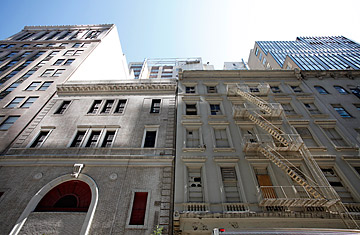
The site of the planned mosque and cultural center, located near New York City's Ground Zero
Should Muslims be allowed to build a mosque at Ground Zero? Merely posing the question is an act of deliberate distortion. As its defenders point out, the Community Center at Park51 will occupy not a solitary inch of the 16-block site on which the Twin Towers stood. Once built, the center will indeed house a mosque, "open and accessible to all" — but also a swimming pool, basketball court, auditorium, library, day-care facility, restaurant and cooking school. The center is being built by a private organization on land it legally owns. Twenty-nine out of 30 lower Manhattan community-board members voted to approve it. By every legal standard, the case for allowing Park51 to be built is, in the words of conservative UCLA constitutional-law professor Eugene Volokh, "open and shut."
But the question isn't going away. President Obama's statement on Aug. 13 endorsing "the right to build a place of worship and a community center on private property in lower Manhattan" has unleashed another storm of partisan bloviation. Obama is "pandering to radical Islam," says Newt Gingrich; John Boehner finds Obama's comments "deeply troubling." On this issue, the President's critics have public opinion on their side: nearly 70% of Americans in a CNN–Opinion Research Corporation poll say they oppose a Ground Zero mosque.
Many opponents of the Park51 project claim that the mosque itself isn't the problem; it's the idea of building it so close to the World Trade Center. Such misgivings have some validity. But the heat the mosque controversy has generated, on both the left and right, is unhealthy, misplaced and ultimately self-defeating. It reflects our tendency to exaggerate the real threat posed by Islamic extremism and what the U.S. should do about it. And nine years after 9/11, the fight over the mosque near Ground Zero shows how obsessed we remain with an enemy that may no longer exist.
The mosque's critics and champions both say their goal is to counter radical Islam. In his Aug. 3 speech defending the Park51 project, New York City Mayor Michael Bloomberg said that "we would play into our enemies' hands" if we were to deny American Muslims the right to build a mosque where they choose. "To cave to popular sentiment would be to hand a victory to the terrorists," Bloomberg said. New York Congressman Jerrold Nadler, a mosque supporter, says, "Everybody's liberty is at stake here." The mosque's opponents make the same argument in reverse. Gingrich has called the Cordoba Initiative part of "an Islamist cultural-political offensive designed to undermine and destroy our civilization." Building the mosque, in the words of one conservative columnist, would be "a symbolic monument to the triumph of Islamism in the United States."
The prevalence of such rhetoric on both sides of the mosque debate makes it seem as if the struggle against global jihadism hangs in the balance. The truth is that Osama bin Laden and his ilk face much bigger problems. The story of the past decade in the Muslim world is that of the widespread rejection — or "refudiation," to borrow a phrase — of terrorism. A study by the Pew Research Center earlier this year found that support in Muslim countries for suicide bombings has fallen precipitously from post-9/11 levels. One-third of Pakistanis believed terrorism was justified in 2002; now just 8% do. For all our anxiety about the rise of religious extremism, no government in the Arab world has been toppled by forces sympathetic to al-Qaeda since 2001. And though some militant Muslims surely wish us harm, their ability to actually inflict it has eroded; it has been more than five years since the last successful al-Qaeda attack in the West.
The eclipse of al-Qaeda has come about largely through revulsion at the jihadists' indiscriminate slaughter of fellow Muslims, from Indonesia to Iraq. And yet we have failed to notice. A Gallup poll taken in June found that Americans still believe terrorism is a bigger threat to the future well-being of the country than health care costs, unemployment and illegal immigration. (Only the federal debt was deemed an issue of equal seriousness.) America's post-9/11 obsession with terrorism, the belief that we are locked in an epic ideological struggle with radical Islam, has stretched our resources to the limit and distracted us from higher-order priorities. National myopia poses a bigger challenge to the U.S.'s long-term stability than terrorism ever will.
What does this mean for the mosque near Ground Zero? However the dispute is ultimately resolved, its impact on the "threat" posed by radical Islam will be negligible. That's because the threat is receding on its own. Allowing a place of worship to be built in lower Manhattan will constitute neither an American triumph nor a defeat. It will simply tell the world that this nation, wisely, has decided to move on.
